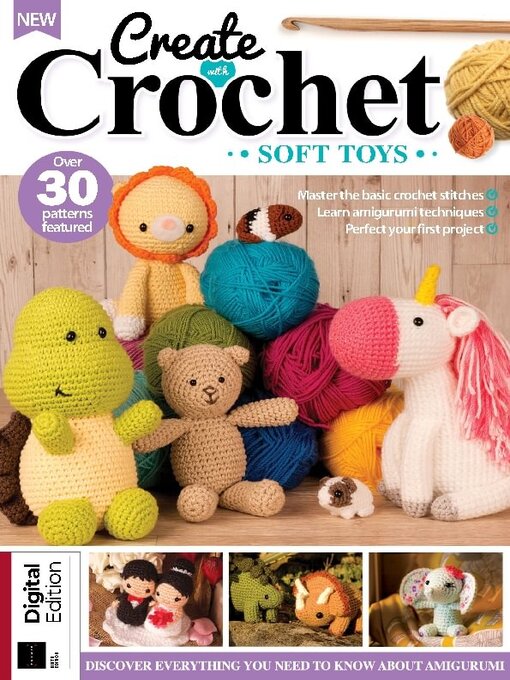Amigurumi is the Japanese art of crocheting small, stuffed creatures made of yarn. Literally speaking, ‘ami’ means ‘knitted’ or ‘crocheted’ and ‘nuigurumi’ means ‘stuffed doll’. It has become vastly popular over the last decade, with people able to sell finished products for over £100! More often than not, you will come across adorable translations of your favourite characters, or cartoon versions of real-life animals that make them even cuter than you could possibly imagine. Then, of course, there’s the other end of the spectrum, with people taking inanimate objects and giving them same treatment. Really, the possibilities are endless, and it’s super simple, worked mostly in double crochets in the round. With over 30 projects to choose from, there’s enough in here to keep you busy for a long time. So pick up your hook, select your yarn and get crocheting!
Welcome to Create with Crochet SOFT TOYS
Create With Crochet: Soft Toys
Getting started
Yarns • From chunky wool to 4-ply acrylic, there is a wide variety of yarns with which you can crochet
Amigurumi kit bag • Although just a hook and a ball of yarn will get you pretty far in crochet, many other helpful tools are available
How to read a pattern • Most crochet projects are made by following a pattern. Although they may look daunting at first, they’re easy to read once you understand the terms
Foundation chain • When working in rows or starting certain patterns in the round, you will need to create a foundation chain to work your first row of stitches into
Working into subsequent rows • When you’ve completed your first row, the only way is up. The next step is to build on the row you’ve just worked
Yarn over • This is the single most basic step in creating crochet stitches, and a technique that’s important to master before moving on
Slip stitch • While rarely used on its own to create a pattern, this versatile stitch is really handy for joining stitches and moving the position of the hook and yarn without adding height
Double crochet • The easiest crochet stitch creates short and compact stitches
Treble crochet • This stitch is twice the size of the single crochet, and worked in a very similar way
Half treble crochet • A less common stitch that is taller than double crochet but not quite as tall as treble crochet
Double treble crochet • This common stitch is much taller than the treble crochet, and this size allows it to be worked into a piece of fabric fairly quickly
Starting in the round • There are two options when working in the round, both of which you can apply to all of your amigurumi projects
Increasing • To increase the number of stitches in a row, simply crochet two or more into the same stitch
Decreasing • Often worked in conjunction with increases when shaping crochet, decrease stitches reduce the number of stitches in a row
Working in the round • Following on from your chain start or magic ring, start working in the round
Amigurumi tension • To ensure you get the best results from your amigurumi creations it’s important to understand a little about tension (gauge)
Fixing mistakes • A benefit of crochet is how easy it is to undo mistakes – all you have to do is unravel to the point where you messed up, then make it right!
Fastening off • When you’ve finished a project, prevent it from unravelling by fastening off
Join a new yarn • If you’re making a project that will use more than one ball of yarn, you’ll need to join the new yarn to your fabric as seamlessly as possible
Joining amigurumi • Make sure that all your pieces are firmly joined together in the final shape
Reading charted stitch diagrams • Some crocheters find these visual...
